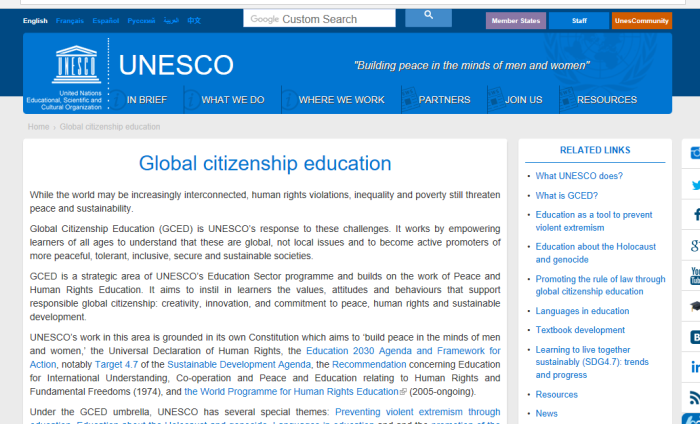
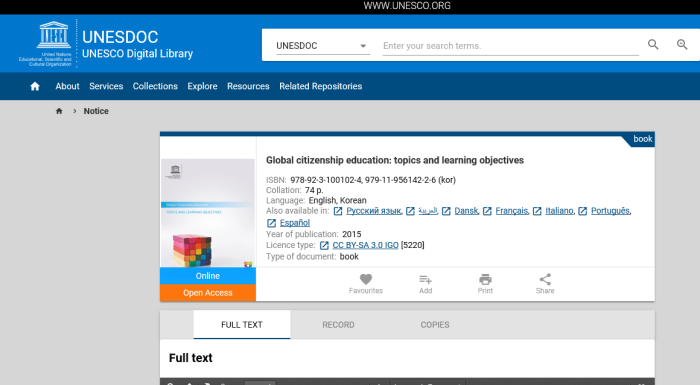
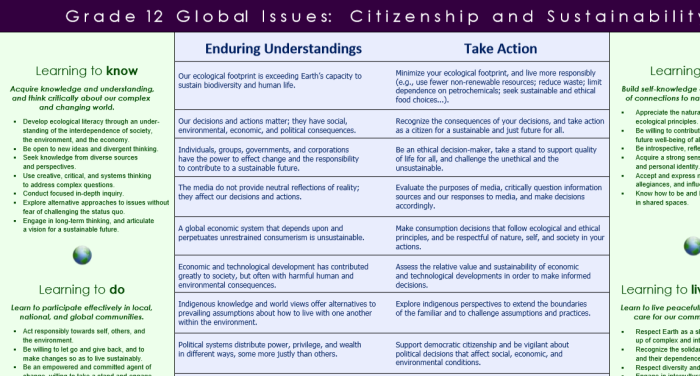
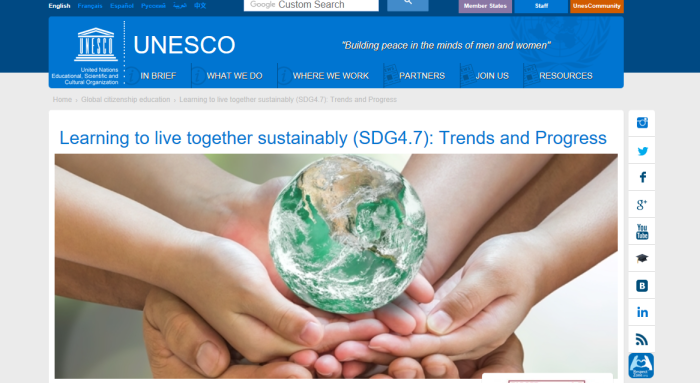
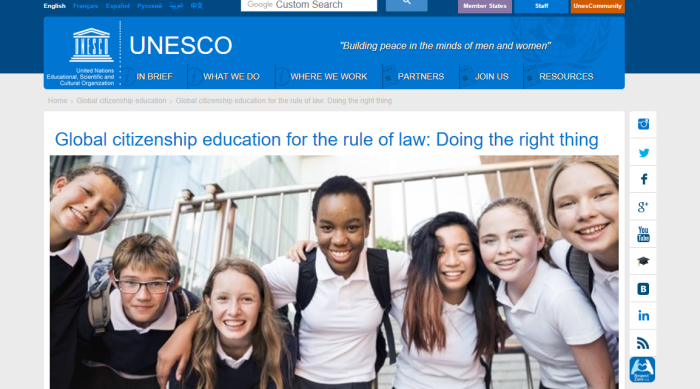
1. Important Links
(1) https://canucklaw.ca/duke-pesta-common-core-education/
(2) https://en.unesco.org/themes/gced
UNESCO Stated Grounds, Bases, Pretexts
(1) https://unesdoc.unesco.org/ark:/48223/pf0000245656
(2) https://en.unesco.org/themes/gced/sdg47progress
(3) https://www.ohchr.org/EN/Issues/Education/Training/WPHRE/ThirdPhase/Pages/ThirdPhaseIndex.aspx
(4) https://en.unesco.org/preventing-violent-extremism/education
(5) https://en.unesco.org/themes/gced/languages
(6) https://en.unesco.org/themes/gced/rule-law
(7) https://en.unesco.org/themes/gced/action
(8) https://en.unesco.org/genderequality
(9) https://laws-lois.justice.gc.ca/eng/Const/page-4.html
2. UNESCO Main Page
UNESCO Main Page
Global citizenship education
While the world may be increasingly interconnected, human rights violations, inequality and poverty still threaten peace and sustainability.
Global Citizenship Education (GCED) is UNESCO’s response to these challenges. It works by empowering learners of all ages to understand that these are global, not local issues and to become active promoters of more peaceful, tolerant, inclusive, secure and sustainable societies.
GCED is a strategic area of UNESCO’s Education Sector programme and builds on the work of Peace and Human Rights Education. It aims to instil in learners the values, attitudes and behaviours that support responsible global citizenship: creativity, innovation, and commitment to peace, human rights and sustainable development.
UNESCO’s work in this area is grounded in its own Constitution which aims to ‘build peace in the minds of men and women,’ the Universal Declaration of Human Rights, the Education 2030 Agenda and Framework for Action, notably Target 4.7 of the Sustainable Development Agenda, the Recommendation concerning Education for International Understanding, Co-operation and Peace and Education relating to Human Rights and Fundamental Freedoms (1974), and the World Programme for Human Rights Education
(link is external)
(2005-ongoing).
Under the GCED umbrella, UNESCO has several special themes: Preventing violent extremism through education, Education about the Holocaust and genocide, Languages in education and the promotion of the rule of law through global citizenship education
UNESCO collaborates with an extensive global network to disseminate GCED including its own Category 1 institutes, other UN agencies and inter-governmental organizations, including regional organizations, most notably: the UNESCO Mahatma Gandhi Institute of Education for Peace and Sustainable Development (MGIEP), the International Institute for Capacity Building in Africa (IICBA), the UNESCO Institute for Statistic (UIS), the Asia-Pacific Centre of Education for International Understanding (APCIEU), the UNESCO Associated Schools Project Network (ASPNet) and UNITWIN/UNESCO Chairs.
3. UNESCO Tramples on Provincial/State Jurisdiction For Education
Sections 91/92/93 of Canadian Constitution lay out areas of jurisdiction
Education
Marginal note:
Legislation respecting Education
93. In and for each Province the Legislature may exclusively make Laws in relation to Education, subject and according to the following Provisions:
.
(1) Nothing in any such Law shall prejudicially affect any Right or Privilege with respect to Denominational Schools which any Class of Persons have by Law in the Province at the Union;
.
(2) All the Powers, Privileges, and Duties at the Union by Law conferred and imposed in Upper Canada on the Separate Schools and School Trustees of the Queen’s Roman Catholic Subjects shall be and the same are hereby extended to the Dissentient Schools of the Queen’s Protestant and Roman Catholic Subjects in Quebec;
.
(3) Where in any Province a System of Separate or Dissentient Schools exists by Law at the Union or is thereafter established by the Legislature of the Province, an Appeal shall lie to the Governor General in Council from any Act or Decision of any Provincial Authority affecting any Right or Privilege of the Protestant or Roman Catholic Minority of the Queen’s Subjects in relation to Education;
.
(4) In case any such Provincial Law as from Time to Time seems to the Governor General in Council requisite for the due Execution of the Provisions of this Section is not made, or in case any Decision of the Governor General in Council on any Appeal under this Section is not duly executed by the proper Provincial Authority in that Behalf, then and in every such Case, and as far only as the Circumstances of each Case require, the Parliament of Canada may make remedial Laws for the due Execution of the Provisions of this Section and of any Decision of the Governor General in Council under this Section.
10th Amendment stresses the States’ rights
>Amendment 10
– Undelegated Powers Kept by the States and the People
The powers not delegated to the United States by the Constitution, nor prohibited by it to the states, are reserved to the states respectively, or to the people.
UNESCO’s “Human Rights” Push Violates Prov/State Rules
Section 91(13) Property and Civil Rights in the Province — clearly Provincial matter
Likewise in the US, human rights/civil rights are decided at the “State” level.
UN Obsession With Immigration Intrudes Prov/State Rights
(Note: This is somewhat off topic, but worth mentioning)
Section 95 of Canadian Constitution
Concurrent Powers of Legislation respecting Agriculture, etc.
95. In each Province the Legislature may make Laws in relation to Agriculture in the Province, and to Immigration into the Province; and it is hereby declared that the Parliament of Canada may from Time to Time make Laws in relation to Agriculture in all or any of the Provinces, and to Immigration into all or any of the Provinces; and any Law of the Legislature of a Province relative to Agriculture or to Immigration shall have effect in and for the Province as long and as far only as it is not repugnant to any Act of the Parliament of Canada<.p>
CLICK HERE, for an immigration article State v Federal rights:
Jurisdiction and the Supremacy Clause
The federal government’s jurisdiction over immigration law has consistently been upheld by the U.S. Supreme Court, which has overruled attempts by state legislatures to single out immigrants. Additionally, the Supremacy Clause of the U.S. Constitution is generally interpreted to mean that federal laws trump state laws, except for certain matters constitutionally left to the states.
However, many states have passed legislation that limits undocumented immigrants’ access to public benefits, directs state and local police to check the legal residence status of arrestees and other directives that affect immigrants. Lawmakers pressing for immigration-related state laws typically cite a lack of federal enforcement and the need to conserve limited state resources, while some cite security concerns.
But are such state laws constitutional? While state lawmakers have articulated a genuine interest in limiting illegal immigration, there is no clear line in the sand. See State Immigration Laws for a regularly updated, state-by-state directory.
Immigration Laws at the State Level
Perhaps the most notorious state attempt at regulating immigration is Arizona’s S.B. 1070, signed into law in 2010. The U.S. Dept. of Justice (DOJ) stated in a brief that Arizona lawmakers “crossed a constitutional line” with the new law. A federal judge blocked four of the most controversial elements, including the requirement that police check the immigration status of anyone they stop or suspect is in the state illegally.
Other states have passed laws with similar police directives, including Oklahoma and Utah. In addition to enforcement measures, many of the state laws addressing immigration mandate the use of E-Verify to check the employment eligibility of job applicants; require identification for voting purposes and impose restrictions on public benefits, such as food stamps and non-emergency medical care at state clinics.
Lawmakers in Arizona and Indiana directly challenged the 14th Amendment’s provision granting automatic citizenship to those born on U.S. soil, proposing legislation that would do just that. Proponents of such laws argue that the amendment’s interpretation should be narrowed to exclude children who are born in the U.S. to undocumented immigrants, positioning their controversial bills for eventual review by the U.S. Supreme Court.
Note: Both in Canada and the US, immigration is generally seen as a Federal matter, though Provinces/States do have some wiggle room.
Since the UN views itself as a “global citizen education” provider, it should come as no surprise that it is creeping towards having a common education curriculum.
Local and regional control is incrementally being phased out.
National pride is being replaced by global acceptance.
UN Leading To Death Of Nations
Put all this in a bigger context:
Global citizens, with global values, a global education, and global “rights”;
- Cultures, customs, traditions replaced by “tolerance”
- Borders replaced by “integrated mechanisms”
- Facilitated by global agreement for free migration;
- A global ban on criticizing “religions” like Islam;
- Global access to internet, but governed by the UN;
- Endless EDA initiatives like Agenda 21, 2030, Paris Accord;
- Governed by a world parliament
Please read this policy idea, first posted on Canucklaw over 3 months ago. You will very likely agree with the conclusion.
